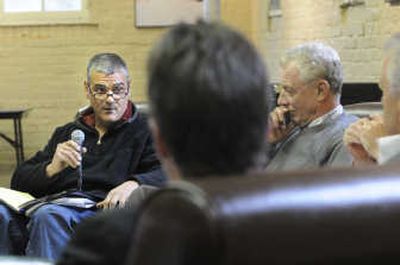Panel discusses environment, human rights

It didn’t take long for a group of businessmen, environmentalists and politicians to agree Thursday night that the key to preserving the local environment and ensuring human rights is working together, communicating and perhaps using less water to brush your teeth.
Yet the panel – part of a discussion sponsored by the Human Rights Education Institute – was aware those goals aren’t easily obtainable, especially in Kootenai County, where the perceived rift between “environmentalists” and “pro-business” is deep and both camps are ready to defend their beliefs.
“In reality – throwing the romance out – are (we) really making an effort here locally to balance?” Coeur d’Alene artist and environmental activist Wes Hanson said, using the example of the recent rewrite of the Kootenai County growth plan. Some local business groups and builders allege they were left out of the discussion on how the county should grow. Hanson noted that he attends most of the weekly workshops and that representatives from the business and building groups are rarely present.
Phil Cernera, director of the Coeur d’Alene Tribe’s Lake Management Department, said that most public workshops aren’t productive and too often attorneys get involved instead of people having conversations to solve problems.
“Most forums are adversarial and people are barking like dogs at each other,” he said.
Ron Nilson of Ground Force Manufacturing, which makes mining equipment, said he puts about 30 hours into volunteer work to better the area but is often accused of getting involved only as a way to make more money.
“If I wanted to make money I would go sell more equipment, not volunteer in the community,” he said.
No tangible solution to try to repair the gap was formed. But that wasn’t really the point of the somewhat experimental gathering.
The idea was to bring a cross-section of local leaders together and talk, not to debate or even discuss. The goal was to create ground for listening to develop an understanding of the other speakers and cultivate ideas or solutions that nobody would have thought of on their own, said facilitator Dennis Conners, program director of Gonzaga University’s Leadership Formation Program.
At first, the concept left most of the eight panelists uneasy and questioning why they were invited, especially with the vast and nebulous topic of the environment and human rights.
Steve Griffitts, president of the local job-recruiting agency Jobs Plus, opened the night saying, “It was interesting to me you would invite me. I didn’t think it was appropriate.”
But in the middle of the dialogue Griffitts noted that it was good to get to know the panelists better and hear varying ideas.
Even institute Director Bob Bennett, who organized the event, was unsure of what could, or would, happen.
“I have no idea where it’s going to go,” Bennett said Wednesday, the day before the event.
Within the first 20 minutes, the group agreed that the environment is important, especially Lake Coeur d’Alene, the Spokane River and the aquifer, because it means a quality of life for everyone.
Retired neurosurgeon Ernest Fokes expanded the conversation more globally and said that environmental consciousness of lakes and rivers in many countries takes second place to mere survival. He said that some people in Haiti are so poor they mix dirt with their pittance of rice so they at least feel full.
Cernera added that Haiti “didn’t start off with people eating dirt” and that that’s a result of pillaged resources. Fokes agreed and added that history shows that the decline of empires is because of a loss of natural resources.
The group, led by Griffitts, agreed that individual accountability, whether it’s picking up one piece of garbage a day or using less water for tooth brushing, will allow sustainability.
“If everybody does something we are all better,” he said.